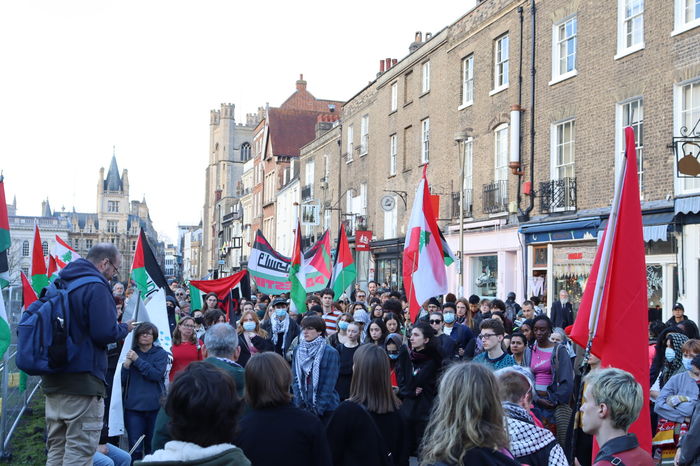Greenwich House occupiers miss deadline to respond to University legal action
The University has applied for a ‘judgment in default’ due the defendants’ failure to offer an acknowledgment of service

The University of Cambridge is pursuing further legal action against protesters who occupied its financial hub, after the occupiers failed to acknowledge a court application made by the University in February.
The University is pursuing a default judgment against individuals who occupied Greenwich House – one of the University’s financial and administrative offices – last year. A default judgment occurs when a defendant has either failed to formally recognise the legal action that has been initiated against them, or failed to file a defence against said action. It allows a judge to make a ruling without the need for a trial to take place.
The University’s application is part of wider legal efforts to ensure the protection of confidential information it claims was accessed by pro-Palestine protesters during the occupation of Greenwich House in November and December. Since the end of 2024, the University has been seeking legal measures to ensure that information it believes was seen by the occupiers is not being stored or distributed.
The latest attempt by the University to pursue legal action against the occupiers has gone unacknowledged by the defendants. This makes the University eligible to apply for a default judgment.
The University first initiated legal action to protect the confidential information stored in Greenwich House in December. The High Court sealed an interim non-disclosure order against protesters who had occupied Greenwich House, identified only as “Persons Unknown” on 16 December last year. The order was put in place to ensure the security of confidential information that may have been accessed by the protesters.
The order concerned protesters who had accessed areas within the building where confidential information is held and who had obtained it through means such as photographing, copying, and scanning. It also related to those who were threatening or intending to release said information.
It also forbade the defendants from distributing any confidential information they had obtained, and required that they either deliver any confidential information in their possession to the University’s solicitors and/or delete it.
Defendants were required to issue the University with a witness statement of truth by 20 December 2024, detailing how they had destroyed the information, confirming whether or not they had provided any third parties with this information, and identifying said third party if this was the case.
The University applied for a review of this non-disclosure order on 14 February 2025, claiming that during the occupation of Greenwich House, the defendants had gained access to confidential agreements. This includes agreements with Rolls Royce, a contract with GCHQ, and individuals’ personal information, including bank details. .
It also claimed that it would have been “obvious” to the defendants that the information was confidential, meaning they were under a duty of confidentiality.
In its application for a review of the interim non-disclosure order, the University applied to the court for an injunction and the issuing of a declaration confirming that the information in question belonged to the University and was confidential. The University also requested the “delivery-up” (return) of all confidential information, that all legal costs incurred by the University be covered, and that the court implement any other relief measures it deemed fit.
Under UK law, defendants have 14 days to file an acknowledgment of service after being served with a claim. An acknowledgment of service is a court form which defendants must complete and return after being served with a claim form. By completing the acknowledgement of service, defendants confirm that they have received the claim form.
The defendants, who the University’s legal team believes are “likely” to be connected with the ‘Cambridge 4 Palestine’ group and to be students, did not respond within this timeframe, which expired on 1 March 2025.
The University then applied to the High Court for a “judgment in default” last Friday (11/04), due the defendants’ failure to offer an acknowledgment of service by the deadline.
The University has applied for the hearing regarding the default judgment to be overseen by a High Court judge, and has requested that it take place at the same time as the hearing for the initial review which the University applied for on 14 February 2025.
The University of Cambridge and Cambridge for Palestine were contacted for comment
 News / Cambridge student numbers fall amid nationwide decline14 April 2025
News / Cambridge student numbers fall amid nationwide decline14 April 2025 Lifestyle / First year, take two: returning after intermission14 April 2025
Lifestyle / First year, take two: returning after intermission14 April 2025 News / First candidate to announce chancellorship bid pledges to tackle bullying 12 April 2025
News / First candidate to announce chancellorship bid pledges to tackle bullying 12 April 2025 News / Uni to ‘review’ tripos rankings and weekend lectures in undergrad teaching overhaul10 April 2025
News / Uni to ‘review’ tripos rankings and weekend lectures in undergrad teaching overhaul10 April 2025 News / PETA urges Cambridge dictionary to change ‘derogatory’ rat definition11 April 2025
News / PETA urges Cambridge dictionary to change ‘derogatory’ rat definition11 April 2025





